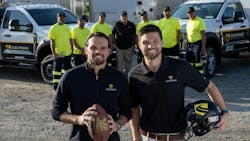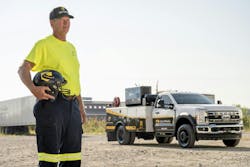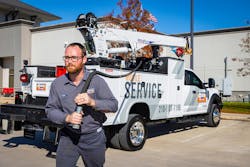Mobile blitz: Coltrain brothers continue family legacy with old-school approach
Key Highlights
- Kyle and Kevin Coltrain are the third generation in their family to run a mobile maintenance business.
- Their grandfather founded Dickinson Fleet Services, which was later run by their father and uncle before selling the business to Cox Automotive.
- The new company emphasizes teamwork, trust, and aims for zero technician turnover.
- Mobile maintenance is a becoming an integral component of outsourced maintenance because the vendor comes to them to perform PMs and crucial repairs, saving the fleet from using their own drivers and even scheduling service during off-hours.
The Coltrain family’s passion runs deep in two areas: football and mobile maintenance. And it might be because they are so similar.
“They both take place outdoors, and there are long days of hard work that bring the team closer,” described Kevin Coltrain, who, with his brother Kyle, kicked off a new business called Coltrain Onsite Fleet Care.
In September, Coltrain rolled out its service offering—mobile fleet maintenance and repairs, emergency service (but not roadside), embedded technicians for shops with labor gaps, and on-site preventative maintenance for fleets—kicking off in the Cincinnati area.
Their mobile technicians and trucks (F-450s and F-550s) will be equipped to service 95% of routine repairs and maintenance. This includes fluid changes, diagnostics, hydraulics, welding—really anything short of catastrophic engine failure or serious collision damage.
The plan is to methodically grind it out in the trenches and ensure they gain positive ground with customers market by market, as opposed to scrambling around the country. Next up is Louisiana, then Alabama and Florida. Texas, Kentucky, and their home state of Indiana will follow.
Indiana, by the way, is where the brothers, who serve as co-executive officers, learned mobile repair and football. They both padded up in high school. Kyle played wide receiver, and Kevin was a fullback. Kyle made it onto the University of Central Florida’s team, while a knee injury cut Kevin’s playing days short.
The brothers don’t expect to fall short in the mobile sector, which they’ve been around their whole lives. Kyle was three and Kevin still a baby when their family started Dickinson Fleet Services in 1997.
This included their grandfather, Bob Dickinson and his brother Dick, as well as their father, Ted Coltrain, and uncle, Mike Dickinson.
Over the years, Kyle, age 30, and Kevin, 29, watched as the family business marched down the field, taking advantage of opportunities and amassing a nationwide reach, innovating software to help track maintenance scheduling, real-time reporting, and inspections along the way.
Then the family sold a majority stake to Cox Automotive in 2021. After integrating operations for the new parent company, Ted and Mike sold their shares of the business, now called Fleet Services by Cox Automotive, earlier this year.
Listen our Fleet Lead podcast interview with Kyle and Kevin Coltrain:
Building an identity
While Kyle and Kevin both still love football, mobile maintenance has the edge in their hearts because it’s where they went pro—and where they truly learned the value of teamwork.
“It’s the ultimate team sport,” Kyle offered, explaining everyone needs to do their job the right way.
When everyone is working together, their team is like the Super Bowl XLI-winning Indianapolis Colts. Though when one link in the mobile service chain fails to deliver, even the equivalent of Tom Brady would get sacked, Kyle reasoned.
He continued, “The most badass technician on the planet can go out and get that truck fixed, but what if we’ve got a bad billing experience in the back end? Or it takes us two weeks to send an invoice, and it’s got errors on it? We fail.”
Like a great football team, Coltrain is building around their playmakers, the front-line workers driving to the customers to execute PMs and repairs. These are the quarterbacks, and to fill the role, Coltrain is seeking “the best-of-the-best talent in the industry, and then fostering that talent and giving them a home forever,” Kyle offered. “We strive for zero employee turnover—in an industry where I think the average turnover is over 60%.”
To do that, they said they’ll provide commensurate pay and benefits.
They also plan to lean away from certain practices responsible for high turnover, such as treating technicians as merely a number, something that makes the metrics on their myriad management dashboards go up or down.
“They’re the most wholesome, strong individuals in the country, and for them to get ping ponged around and observed as a widget or a profit center and not a human being is what has driven Kevin and me crazy,” Kyle said.
Trust is the final component, with the brothers encouraging techs to call audibles in the field, something Peyton Manning famously did on that Colts team.
This was proved out with mobile technician Guenter Grote, who has already scored the customer-service equivalent of a touchdown. The job was simple: drive up from Cincinnati to the Columbus area to replace a wheel for a trucker waylaid at a highway rest area.
Grote knew the drivers would have been there for a few hours by the time he got the replacement part and drove up Interstate 71, and it was getting to be about lunchtime. He texted the fleet manager and offered to pick them up something to eat, insisting on paying for it because they were waiting for so long.
The customer immediately called Grote’s manager, starting with, “Your tech just texted me…”
His manager was expecting to hear bad news, because why else would the customer call and not Grote? But the customer was indeed ecstatic at the personal care and human decency shown to his driver. And on Truck Driver Appreciation Week, no less.
It was no big deal for Grote. He was only doing what he learned working with his dad long ago.
“If a customer’s driver broke down, either at the scale house or rest area or wherever, [my dad] would bring them something along, where they had something to eat and drink,” Grote said matter-of-factly.
This was about the best news owners Kevin and Kyle Coltrain could hear. This mobile tech wasn’t afraid to make a decision and, in turn, made a lasting impression.
“No one told our technician to do that, but we also never told them not to,” Kevin said.
What the brothers do tell their team is to “take care of the customer, treat them with best-in-class service,” Kyle added.
“Our biggest mission and what’s going to separate us from our competitors is how well we treat our employees,” he said. “And in turn, they’ll treat our customers like that every day.”
Coincidentally, this is something they learned working for their family business, and later Fleet Services. Now they are on their own and running things their way, taking what they learned from the past and applying their own spin.
They’ll need every trick in the playbook, considering the stiff competition.
Forward progress
The mobile sector is already a crowded field: Amerit Fleet Solutions, Fleet Services by Cox Automotive, Love’s, Torque by Ryder, and Rush Truck Centers are just a few of the many big-name options fleets have.
But there’s no shortage of demand.
“Now is an ideal time to launch a mobile fleet service provider because the market is growing and customer expectations are shifting,” Kyle asserted. That shift is one that favors convenience. It’s hard to spend most of your life getting everything delivered right to your doorstep, but you must pay a driver to deliver your truck to a brick-and-mortar shop—and have that asset out of service for simple PMs. Kyle said fleets are “waking up” to this.
“We are coming to you during the hours that your business is already scheduled to have those units down: nights, weekends, early mornings,” he said. “That’s when our team wants to be there, not during traditional shop hours.”
Fleets do pay for that convenience. In addition to any service call fees, mobile labor rates are 7.2% higher on average at $149/hr, according to Fullbay’s 2025 State of Heavy-Duty Report. Four out of five shops surveyed said they offered some mobile service.
“The growth of mobile maintenance in the trucking industry is being driven by the rising cost of downtime, the need for greater flexibility, the ongoing difficulty in hiring qualified technicians, and fleets’ desire to complete service work after hours,” said Mitchell Scates, director of Mobile Service for Rush Enterprises. “As demands on fleets continue to increase, mobile maintenance has become an essential strategy to keep trucks operating efficiently and businesses moving forward.”
Rush Enterprises now has more than 700 technicians working away from Rush Truck Centers—mostly mobile techs working out of the truck, with some staying long-term on customer sites.
Scates said fleets’ need for embedded techs “is driven by technician shortages, temporary workload increases, or the needed skill set they do not currently have in-house.”
Rush also recently added welding services and same-day PMs and repairs.
And that trend will continue for the foreseeable future. According to an industry report Coltrain cited, by 2030, outsourced maintenance is predicted to grow a minimum of 25% overall, while mobile specifically could be 50-60% higher than today.
The growth opportunities have created a lot of movement in the mobile space. Last March, Fleet Maintenance had discussed with Epika’s CEO at the time, Joe Dougherty, how the company was set to double in size. Their strategy was to acquire small independent mobile owners, then keep them on as employees. Leveraging the economies of scale, Epika would then supply them with the tools and technology they could not afford themselves. That model was enticing enough for a private equity fund managed by Ares Management Corporation to acquire Epika this spring.
Kyle said the changing mobile landscape, and “growing corporatization in the industry” prompted him to start this new family-owned venture with his brother, who left his role at Cox—one where they can stand on the sidelines and let their managers play owner in their assigned region.
“We believe in hiring very entrepreneurial-minded field leadership who treat their local market as if it’s their own business,” Kyle said.
New dynasty
One of Kyle’s favorite football quotes comes from famed Alabama Crimson Tide Coach Nick Saban: “Mediocre people don’t like high achievers, and high achievers don’t like mediocre people.”
Because he wants the new family business to succeed, he subscribes to the philosophy of “coaching up or coaching out.” Coltrain says it will provide its team members—whether in operations, administration, leadership, or the field—with the training and tools needed to win. For the techs this means dashcams and telematics on the trucks and everything they need to complete diagnostics and repairs.
Kyle said Coltrain will provide training and help to team members to get to where they need to be, and good work comes with “massive upside rewards.”
On the flip side, if one region is performing poorly and bringing the whole team down (drawing a personal foul, if you will), they should not expect to reap the same rewards.
“It’s definitely not a company where, if [one region] is carrying the weight for the rest of the company, we’re all going to be rewarded equally,” he asserted.
As for dealing with all the opponents in the sector, Kyle’s strategy harkens back to his football days: fostering a culture heavy on internal competition; and not worrying about the other mobile providers.
“When I would line up at practice, my job was to beat the defensive backs I was going up against, and his job was to beat me—and that would make us better,” Kyle explained.
Likewise, he hopes the Louisiana team will want to outperform the Cincy team. That could really benefit a trucker downed near New Orleans. Whereas Grote gave the Ohio driver Burger King, the Nawlins tech could easily outdo that with a muffaletta and beignets.
The sibling rivalry does have its limits, though.
“It’s one team,” Kyle concluded. “We’re sharing best practices all the time.”
Kevin, meanwhile, wants to get back to the days where the Dickinson clan and mechanics would come together for “tight-knit” company picnics.
“It wasn’t a company more than it was a family,” he said. “Over the years, as the industry has grown, that family touch has somewhat gone away.”
If the Coltrains can manage to bring that back, in an age of private equity funds and flexible time off instead of paid time off, where company parties are held on Microsoft Teams, now that would truly be innovative.
About the Author

John Hitch
Editor-in-chief, Fleet Maintenance
John Hitch is the award-winning editor-in-chief of Fleet Maintenance, where his mission is to provide maintenance leaders and technicians with the the latest information on tools, strategies, and best practices to keep their fleets' commercial vehicles moving.
He is based out of Cleveland, Ohio, and has worked in the B2B journalism space for more than a decade. Hitch was previously senior editor for FleetOwner and before that was technology editor for IndustryWeek and and managing editor of New Equipment Digest.
Hitch graduated from Kent State University and was editor of the student magazine The Burr in 2009.
The former sonar technician served honorably aboard the fast-attack submarine USS Oklahoma City (SSN-723), where he participated in counter-drug ops, an under-ice expedition, and other missions he's not allowed to talk about for several more decades.


